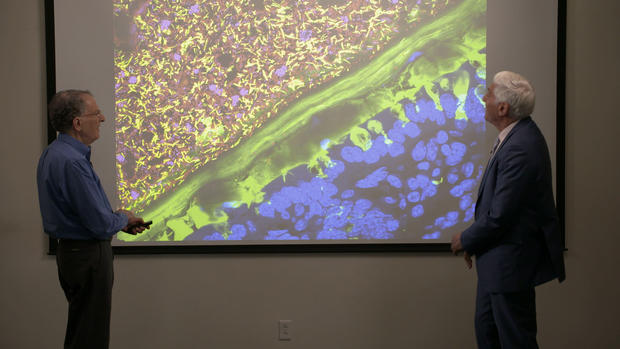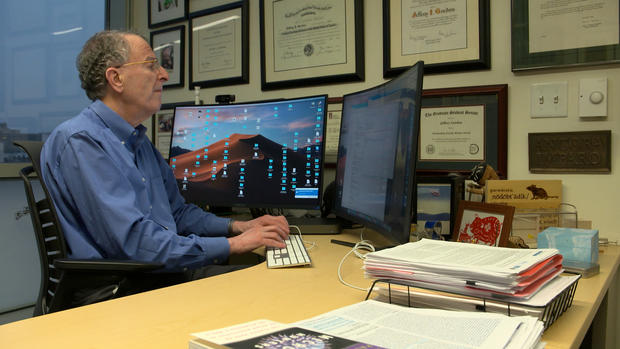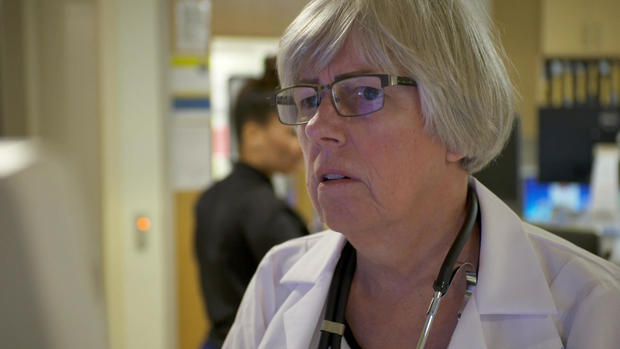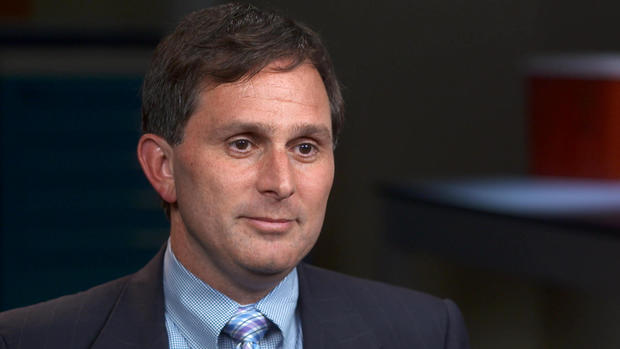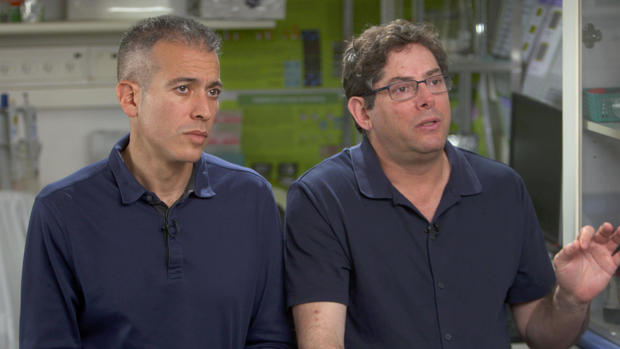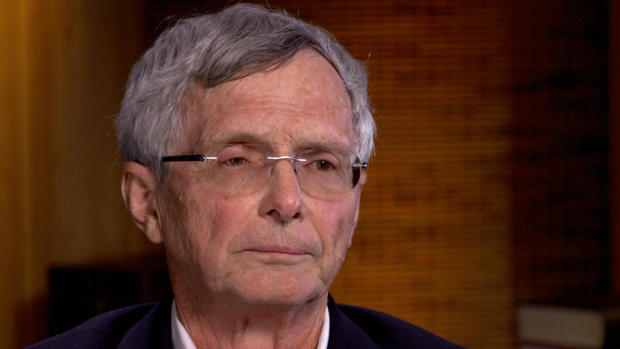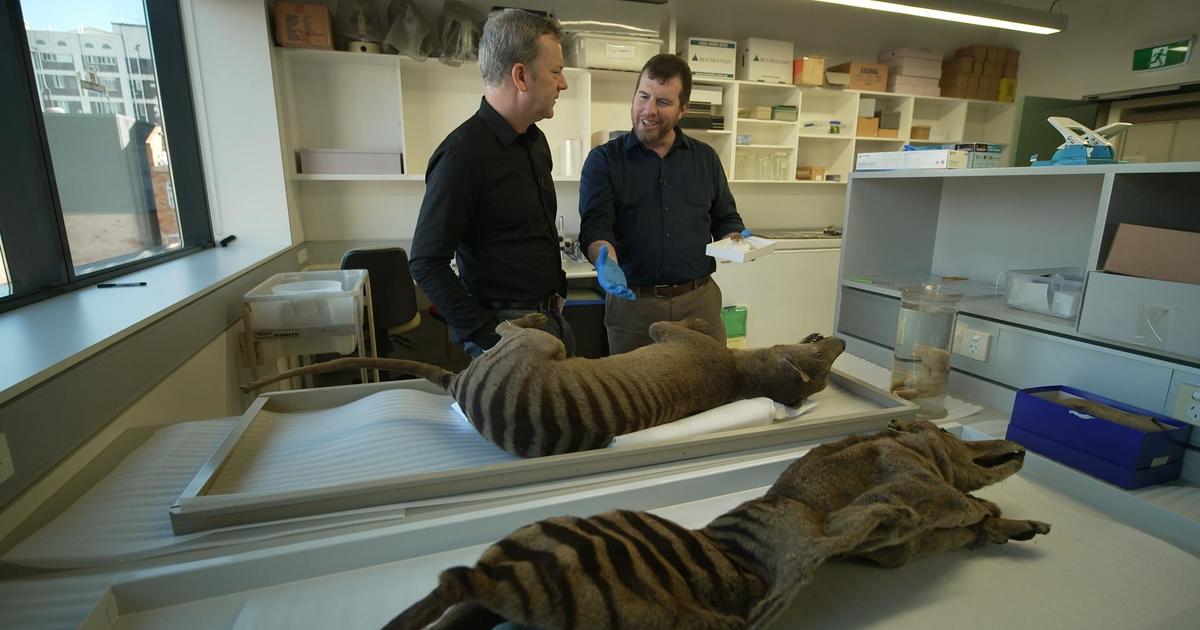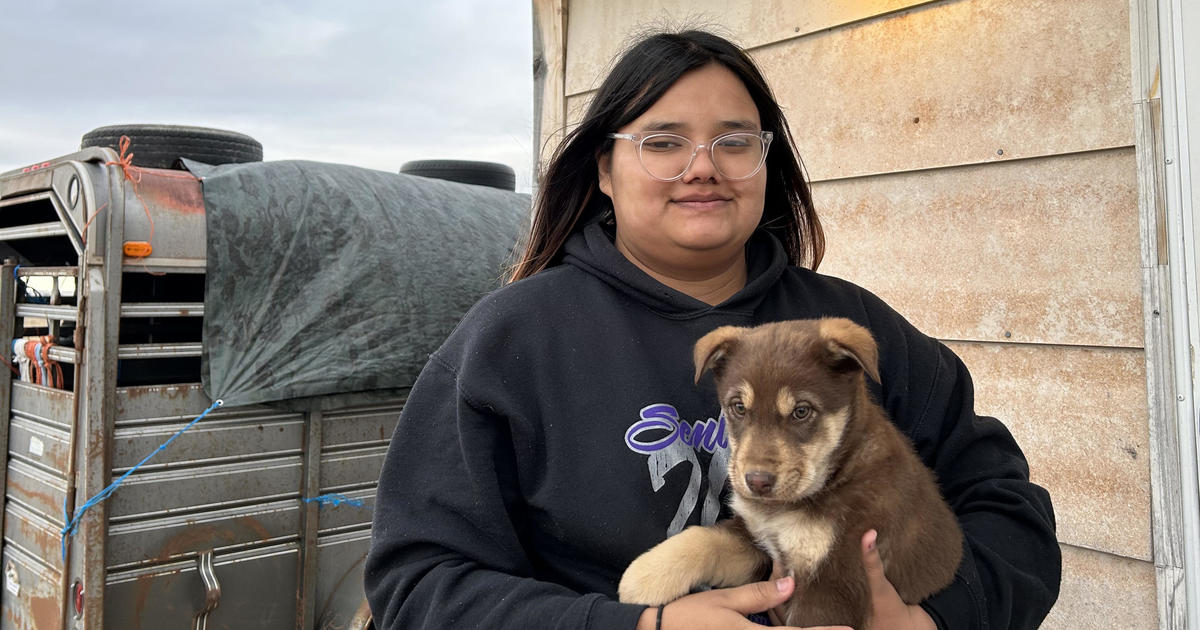Do probiotics actually do anything?
There is an invisible universe hidden inside your body, it's called the gut microbiome -- a vast array of trillions of intestinal bacteria, hundreds of different species. They help digest your food in exchange for a warm, safe place to live. And we are only now starting to discover the gut microbiome plays a much larger role in our lives than we ever imagined.
Some of those bacteria found inside us are replicated in commercially manufactured mixtures called "probiotics." You see them on grocery and pharmacy shelves, and they're recommended by your friends and often, by doctors like me.
But do probiotics actually do anything? To find out, first you need to know about the gut microbiome.
Dr. Jeff Gordon: This is a snapshot of the microbiome.
Dr. Jon LaPook: And then this is the trillions of bacteria there. They're represented by the different colors.
Dr. Jeff Gordon at Washington University in St. Louis is recognized as "the father of the microbiome." He has spent decades exploring the mysteries of the bacterial community in our gut.
Dr. Jeff Gordon: It's a collection of microbes that are able to coexist with us in ways that still are unclear.
Dr. Jon LaPook: Why are they there in the first place?
Dr. Jeff Gordon: They help process the food that we consume, but they do a lot more than that. They make Vitamins. We think about vitamins as only being in food. they're able to produce essential amino acids, they're able to talk to our immune system and help educate the immune system.
Dr. Jon LaPook: That's different than I think the way a lotta people think about the intestinal track. It's sorta like a tube, and the food comes in and it goes out, and that's it. But you're saying there's much more of an interaction?
Dr. Jeff Gordon: We're coming to understand that much more clearly. and this capacity to process-- the food that we consume is linked to our health as well as our disease states.
Research suggests a healthy microbiome may reduce the risk of diseases like cancer and diabetes. And in a landmark experiment, Dr. Gordon and his team made a lean mouse fatter by giving it the bacteria of a fat mouse.
Dr. Jon LaPook: Are you saying that part of the cause of obesity might be the types of bacteria that are in the gut, in the microbiome?
Dr. Jeff Gordon: I am saying that. And we see that individuals who are obese have a less diverse microbial community compared to individuals who are lean.
Dr. Jon LaPook: Is there evidence that you could take the microbiome that's associated with a lean person, transfer it to somebody who's overweight, and it might somehow help them to become thinner?
Dr. Jeff Gordon: There's a lot of work-- going on right now, trying to test that hypothesis.
Right now, the microbiome is an area of hot research. Doctors are already treating illness by manipulating gut bacteria. A potentially life-threatening infection of the colon called C. Diff. has been successfully treated by moving bacteria from the gut of a healthy person to the gut of somebody who's sick.
And millions of people are trying to improve their microbiomes themselves using probiotics, so-called "good bacteria." But here's the problem: there's a lot of conflict among scientists about whether probiotics provide any benefit at all.
Dr. Patricia Hibberd: Over the years there have been so many studies of various probiotics saying "it's good for this." The next study says, "it's not good for this." And truly, it's chaos.
Dr. Patricia Hibberd is an infectious disease specialist and a professor of medicine at boston university.
Dr. Hibberd has reviewed hundreds of studies in the medical literature about probiotics. She has also done her own studies and told us there's not enough high quality research to recommend off-the-shelf probiotics for the medical problems for which they're commonly used.
Dr. Patricia Hibberd: The whole idea that maybe throwing in good bacteria that we would take by mouth that hopefully would land in the right places in the GI tract and work with the immune system. We just don't know how to do any of that.
Dr. Jon LaPook: But right now, there is a multi-billion dollar industry that's growing.
Dr. Patricia Hibberd: Yes.
Dr. Jon LaPook: And people are out there buying this stuff.
Dr. Patricia Hibberd: Right.
Dr. Jon LaPook: So, is there convincing evidence that commercially available probiotics have been found to be beneficial for reducing diarrhea from antibiotics?
Dr. Patricia Hibberd: No.
Dr. Jon LaPook: Treating irritable bowel syndrome?
Dr. Patricia Hibberd: No.
Dr. Jon LaPook: Decreasing allergies?
Dr. Patricia Hibberd: No.
But probiotics are suggested as a remedy for all those things… and more.
ALIGN COMMERCIAL: Your digestive system has billions of bacteria. But life can throw them off balance.
Restoring that balance of bacteria in the gut microbiome is just one goal touted by makers of probiotics, a $50 billion global industry sold to us in capsules, popsicles, cereal, tea and some yogurt. And we're told probiotics can even help your dog.
Many physicians and patients believe probiotics are worth trying, and many believe they work.
One of those physicians is Dr. Dan Merenstein. He's a professor of family medicine at Georgetown University. And he's on the board of a non-profit, industry-financed group that promotes probiotic science.
Dr. Merenstein is doing a clinical trial backed by the National Institutes of Health testing a probiotic cocktail. He's trying to see if it can prevent diarrhea in children taking antibiotics, a remedy other researchers have tried with mixed results.
Dr. Dan Merenstein: I think the data is there. I recommend probiotics mainly for people who are on antibiotics and for people with irritable bowel disease.
Dr. Jon LaPook: I wonder what our viewers are thinking right now, right? They're hearing you saying, it definitely helps, probiotics and others are saying, there's no good evidence that it helps. Are they throwing a brick through the television screen just about now?
Dr. Dan Merenstein: ...they are but they have been throwing a brick, you know, for the last 20 years when we tell them everyone needs Vitamin D, and everyone needs, you know, Echinacea for colds, or zinc for colds. I think it's difficult to be a consumer because things change so quickly. But I think we need more probiotic research.
One cause of confusion may be the placebo effect: some people using probiotics may feel better because they expect to feel better. And figuring out what probiotics do inside the gut is complicated. One reason is that each person's microbiome is unique, so the same probiotic may have different effects on different people. That's exactly what professors Eran Elinav and Eran Segal found at Israel's Weizmann Institute of Science.
Eran Elinav: We wanted to directly assess what the probiotics were doing and how they interact with what's already inside in our gut.
The researchers collected thousands of samples from a small group of adult volunteers who were given probiotics.
Eran Segal: We've actually looked across the entire gastrointestinal tract at places where nobody has looked before.
The volunteers all underwent multiple endoscopies and colonoscopies.
Dr. Jon LaPook: So you're going down the swallowing tube, into the stomach, and into the first part of the small intestine. And then colonoscopy, you're coming from below.
Eran Elinav: Exactly. And then we gave some of these volunteers a very large combination of probiotics that are out there in your supermarket. And half of the individuals were given what we call placebo, which is an empty pill.
Eran Segal: so the results were actually very striking so what we're seeing is that half the people take the probiotics and the probiotics, as they go in, they just go out and they don't populate the gut.
Dr. Jon LaPook: Was that surprising to you?
Eran Elinav: That was highly surprising to us, most of us or all of us, are under the assumption-- these probiotics would settle in at least temporarily in our gut, and would do the good things that we expect them to do.
The researchers also studied a treatment commonly recommended by doctors, giving probiotics to help restore the balance of gut bacteria wiped out by antibiotics.
Eran Segal: We found that the probiotics actually delayed the restoration of the bacteria of those individuals to what they had before as compared to individuals who took antibiotics and then did nothing.
Dr. Jon LaPook: So here a lot of us have been taking probiotics with antibiotics because we think maybe that'll help us get back to normal more quickly. And this is showing the opposite.
Eran Segal: Exactly.
Eran Elinav: Exactly.
Elinav and Segal's findings contradict much of the conventional wisdom about probiotics. Other scientists are now building on their work.
Eran Segal: To be clear we're not against the concept of probiotics in general. We actually think that probiotics may have huge benefits.
Eran Elinav: But, we need to be very cautious in generally prescribing these microbes without knowing enough of what they do.
But we were surprised to learn that probiotics are added to some baby food and even infant formula. About a fifth of the top selling infant formula in the United States contains probiotics. And the market is growing.
Dr. Frank Greer: Most parents don't realize-- how little work there is to support the use of probiotic in infants.
Dr. Jon LaPook: And yet, it's being used.
Dr. Frank Greer: It's being used.
Dr. Frank Greer is professor emeritus of pediatrics at the University of Wisconsin. He is co-author of the American Academy of Pediatrics clinical report on probiotics.
Dr. Jon LaPook: So when you add probiotics to infant formula at this early stage, what could happen?
Dr. Frank Greer: I wish I could answer that question, but I think part of the answer to that is we don't really know how probiotics work.
Dr. Jon LaPook: So if we don't know how they work and we're not sure what they do, why are we adding them to infant formula?
Dr. Frank Greer: That's a great question. Why are we giving 'em to infants.
Dr. Jon LaPook: Is there any convincing evidence that adding probiotics to infant formula is good for the baby?
Dr. Frank Greer: My answer to that would be no.
That answer was unexpected coming from Dr. Greer. You see, a baby formula trade group -- the Infant Nutrition Council of America -- recommended him to explain their point of view.
Dr. Jon LaPook: So then why are we seeing it in so many different products?
Dr. Frank Greer: Well, it's easy to put in there, because it's not very tightly regulated.
The Food and Drug Administration, the FDA, does not classify probiotic capsules as drugs. That means they do not have to be proven "safe and effective." When added to anything, including infant formula, probiotics only need to meet a lower standard: "generally recognized as safe."
In rare cases, probiotics have been linked to severe infections in critically ill patients and those with weakened immune systems. Otherwise, they appear to be safe
Dr. Jon LaPook: If you could give probiotics early in life and potentially help, couldn't those same probiotics down the line have unintended consequences and hurt?
Dr. Frank Greer: It's possible, but I can't attest that there's any harm whatsoever down the line. There's-- there's no evidence that says they're harmful.
Dr. Jon LaPook: But are there long-term studies?
Dr. Frank Greer: No, there are no long-term (LAUGH) studies
Without those studies, there's no way of knowing if giving probiotics to infants has unintended long-term consequences. The infant formula trade group, which recommended we interview Dr. Greer, sent us this statement: "In formula-fed babies, probiotics promote a balance of bacteria in a baby's gut" and "simulate the benefits provided by breast milk."
Dr. Frank Greer: Well, I think that ultimately formula industry's goal--
Dr. Jon LaPook: It's their goal, but is--
Dr. Frank Greer: That's their goal.
Dr. Jon LaPook: Is that's what's happening--
Dr. Frank Greer: This doesn't do it. You know? Putting a single probiotic organism in an infant formula doesn't promote the balance they're talking about.
Despite disagreement about how or whether today's probiotics work, every scientist we spoke with was hopeful about the possibility of improving health by manipulating the microbiome. Last year, Dr. Gordon's team reported that a special supplemental mixture of nutrients containing chickpeas, soy, bananas and peanuts can repair the damaged microbiome of malnourished infants.
Dr. Jeff Gordon: Think about this. The idea that a defective development of a microbiome could impair the development of bones, of the immune system, perhaps even the central nervous system. How incredibly extraordinary that our collection of microbes is so impactful? That's inspirational. But the task ahead is complex. We want to be able to develop interventions that are safe in the short term and in the long term. And we wanna make sure that we have it right.
Editor's Note: After this story aired, the Infant Nutrition Council of America told 60 Minutes that Dr. Frank Greer does not speak for the infant formula industry.
Produced by Julie Holstein and Howard L. Rosenberg. Associate producer, Deborah Rubin. Broadcast associate, Jacqueline Kalil. Edited by Joe Schanzer.
